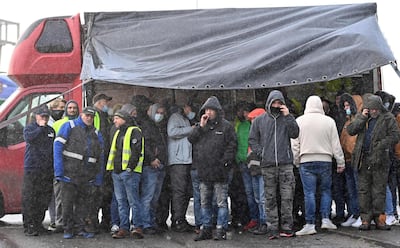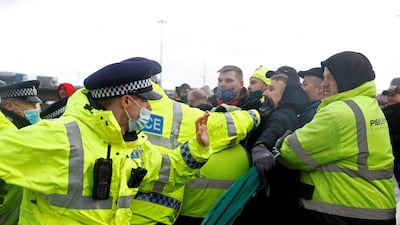Stranded lorry drivers scuffled with police on Wednesday after a deal was struck to allow traffic to move from the English port of Dover to mainland Europe.
Several thousand lorries were parked near the port when France imposed a 48-hour travel lockdown after a fast-spreading mutation of coronavirus took hold in southern England.
Angry drivers left their cabs in the morning, jeering and whistling at authorities, with many shouting "open the borders" and "we want to go home".

The ban on lorries moving to France was lifted on Wednesday. Hauliers will be tested for the virus before being allowed to board ferries or the cross-Channel rail service to the continent, where cases of the new mutation have been identified.
The stand-off began on Sunday night when French authorities shut the border with Britain as news of the highly-contagious Covid-19 variant emerged.
At least 55 counties around the world have since introduced travel bans on passengers from the UK in a bid to keep the mutation from spreading.
The European Commission on Tuesday advised against a blanket travel ban but said non-essential travel should be discouraged.
A British minister said "common sense has prevailed" on Tuesday after the European Commission advised EU member states not to restrict freight movements because of concerns over shortages and disruption to vaccine supplies.
Thousands of lorries, the majority from mainland Europe, were stuck for days on roads and parked at an airport because of the dispute. The government said the traffic jam will take days to clear and that it will bring in the army to help set up testing facilities at the airport.
“The scientific evidence suggested that HGV drivers were relatively unlikely to pass the virus,” Housing Minister Robert Jenrick said. “These were arguments we have made... common sense has prevailed.”
He said he hoped that the first lorries would start crossing to France on Wednesday morning.
Drivers grew increasingly angry as it became clear they may not get home for Christmas. Many were stranded in their vehicles without access to hot food or bathrooms.
"They don't give us food, they don't give us drinks, they don't give us sanitation, they don't offer us anything," one driver said. "The situation is basically inhumane, so what we are asking for is a solution."
Drivers will first take a lateral-flow Covid-19 test. Anyone with a positive result will take a more comprehensive PCR test, for which results take longer to process. Anyone testing positive again will be given a hotel room in which to isolate.
A mobile testing site was set up at Manston Airport, 29 kilometres from Dover. The International Road Transport Union said that even a 30-minute test would be "a disaster", with UK authorities having to test at least 6,000 drivers a day.
Kent Police confirmed that one person had been arrested following an incident at the Manston site.
European officials said the saga provided an insight into the trouble the UK is likely to face in the event of a no-deal Brexit.
A temporary arrangement preserving the free flow of goods between Britain and the 27-nation bloc will end on December 31 and negotiators are deadlocked on fishing rights and ensuring fair competition.
The government is bracing for a 7,000-lorry snarl-up in the event that no deal is reached. Guy Verhofstadt, a former Brexit co-ordinator for the European Parliament, said the past 48 hours hinted at chaos to come.
“We forgot what borders look like,” he tweeted. “They [the UK] will now start to understand what leaving the EU really means.”
Some British politicians have criticised Macron's move to close the ports, with some accusing him of performing a political stunt.
"I'm afraid this was an example of politics spilling into the hardship of managing this pandemic," British MP Tobias Ellwood told The National. "It is unfortunate that as negotiations reached a critical juncture, that this action should muddy the waters."
A food industry chief warned of further mayhem after the disruption outside Dover, which raised concerns of shortages of vegetables in UK shops.
“This kind of chaos and this kind of delay could easily be a presaging of what is to come,” Ian Wright, chief executive the Food and Drink Federation, told Bloomberg. “It’s lifting the curtain a little on the chaos that could happen if it all goes horribly wrong.”
The end of the travel ban is a plus for the UK government, which is expected to extend restrictions on the population because of the surge in Covid-19 cases, blamed in part on the virus mutation.
Much of the world shut its borders to Britain this week after the variant spread quickly. The government’s Covid operations committee is meeting on Wednesday to consider the latest data amid reports that Birmingham, the UK’s second-largest city, could join London by imposing the most restrictive measures.
The new variant, which is said to be 70 per cent more infectious than previous strains, has already spread around Britain, with cases identified in Wales and Scotland.
Similar problems were reported in mainland Europe with Germany recording 962 Covid-related deaths, a new one-day record.
To curb the spread, the German government last week shut most shops, tightened rules on social contact and discouraged people from travelling to see relatives over Christmas.


























